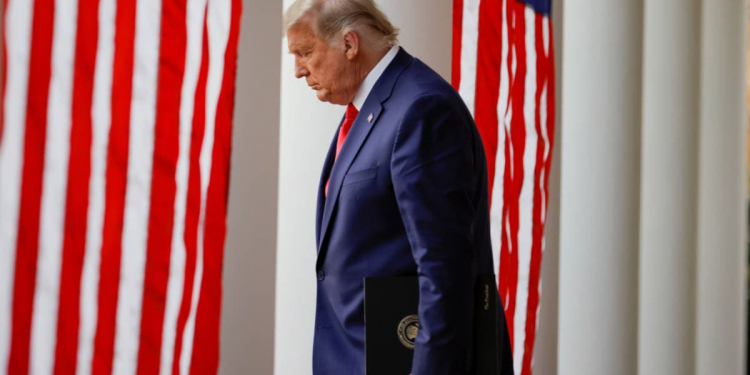Chinese markets are feeling the heat from the latest drama surrounding two property developers: Evergrande and Donald Trump. The latter will potentially have more impact.
A Hong Kong court this week ruled that, two years after it defaulted on its debt, Evergrande should be liquidated. Further tension lies ahead in the form of a tussle over whether mainland Chinese authorities will carry out this act of euthanasia. If they do, it will come as no surprise to any remaining foreign investors, who are already sitting on worthless assets, that they are likely to be right at the end of the queue for any payments.
The whole ugly scene is not exactly comforting for markets, which are already wearing the scars of sluggish Chinese economic data. Hong Kong’s Hang Seng stocks index has fallen 7.5 per cent this year — a decent drop considering we have only just started the second month of 2024. China’s CSI 300 is 6 per cent lower. Authorities have responded with various efforts to prop stocks up, with little obvious success. It is not a pretty picture.
By contrast, Japan can boast a 7 per cent rise in stocks in yen terms (or 3.4 per cent in dollars — still a very respectable start to the year). The US S&P 500 wobbled pretty significantly on this week’s hint from the Federal Reserve that it is in less of a hurry to cut interest rates than traders had hoped, but the index is still pinned close to its highest level in history.
Investment textbooks would tell you to buy the dip in China. It is darkest just before dawn, and all that. A heavy-duty package of support must be around the corner, the theory goes, so it arguably makes sense to dip a toe in.
“For a trade, China looks fantastic because everybody hates it,” said Patrick Spencer, vice-chair of equities at Baird. “This is an economy that is still growing at 5 per cent,” he added. For Spencer, now is not the time to make a large, bold strategic allocation, but a nibble may make sense.
World-weary emerging-markets specialists, however, suggest even that is a stretch. Putting money to work in China now demands that you are “brave, or knowledgeable, or crazy”, said Xavier Hovasse, head of emerging-market equities at French asset manager Carmignac. (He puts himself in the second category, I checked.)
China’s property sector is in a “hopeless” mess, he said — one that probably cannot be fixed. The Evergrande denouement is a neat reminder of everything that is wrong with the Chinese economy, he said, but that is already well known. Instead, Hovasse argues it is the consensus assumption that Trump will secure the Republican nomination for November’s US presidential election that is weighing more heavily on markets. Maybe even more than mainland China’s fraught relationship with Taiwan.
Note, for example, that it was not the Taiwanese election on January 13 that provided the first real jolt lower for Chinese stocks in 2024. The following trading days were very calm. Instead, it was Trump’s strong result in the Iowa primary caucus a couple of days later, mixed in with a slightly disappointing economic growth reading for China, that preceded a 2 per cent slide in Chinese stocks.
Stocks from Chinese companies with strong links to the US are suffering more than most, Hovasse added, particularly on the back of reports that the GOP frontrunner is working up some truly punishing tariffs on imports from the country.
“Last year, people were saying the Chinese economy was weak, so buy stocks that have more business outside China. They traded at a premium,” he said. “Now it is the exact opposite.”
Tina Fordham, founder of geopolitical consultancy Fordham Global Foresight, agrees that markets are right to be cautious. But she stresses that Trump does not yet have the nomination formally sewn up, nor is it obvious that he would achieve an election victory. His capricious approach to global politics also means he could easily change course, and in any case, China-bashing has strong bipartisan support.
So, how worried should the average investor be? For most, not very. China-related stocks make up a tiny slice of the MSCI All-Country World index after all, dwarfed by some individual stocks such as Apple and Microsoft alone. The consensus bet on Chinese stocks this time last year also flopped in spectacular fashion after the end of zero-Covid restrictions failed to produce a widely anticipated economic surge, so non-specialist investors have tended to stay away.
Dedicated emerging market investors, however, have little choice but to try to pick a way through this mess, as the MSCI EM benchmark still has a 22 per cent weighting towards China — slimmer than it was in the past but still very significant.
Those investors could choose to tilt towards something more rewarding and straightforward, such as scaling back on China and bumping up allocations to the likes of Mexico or India — two of the hotter bets in emerging markets this year. Clever strategies within China could avoid anything with a property flavour and any companies with significant US sales. It is no wonder, Hovasse said, that EM investors “have grey hair”.
Financial Times































Discussion about this post